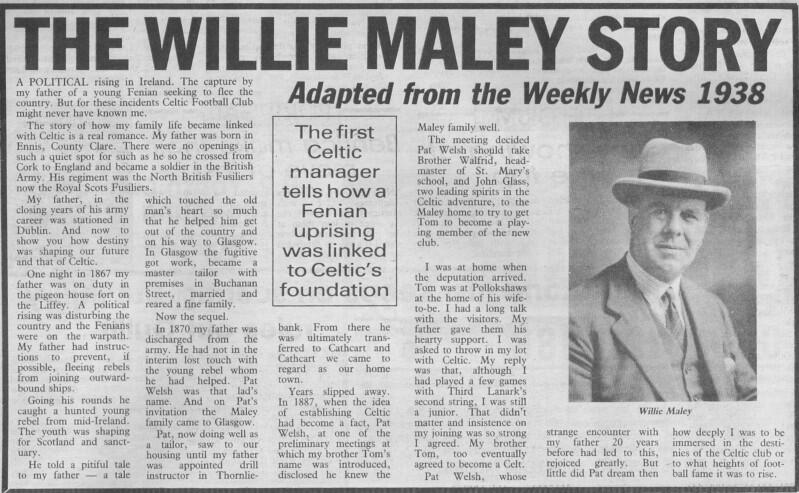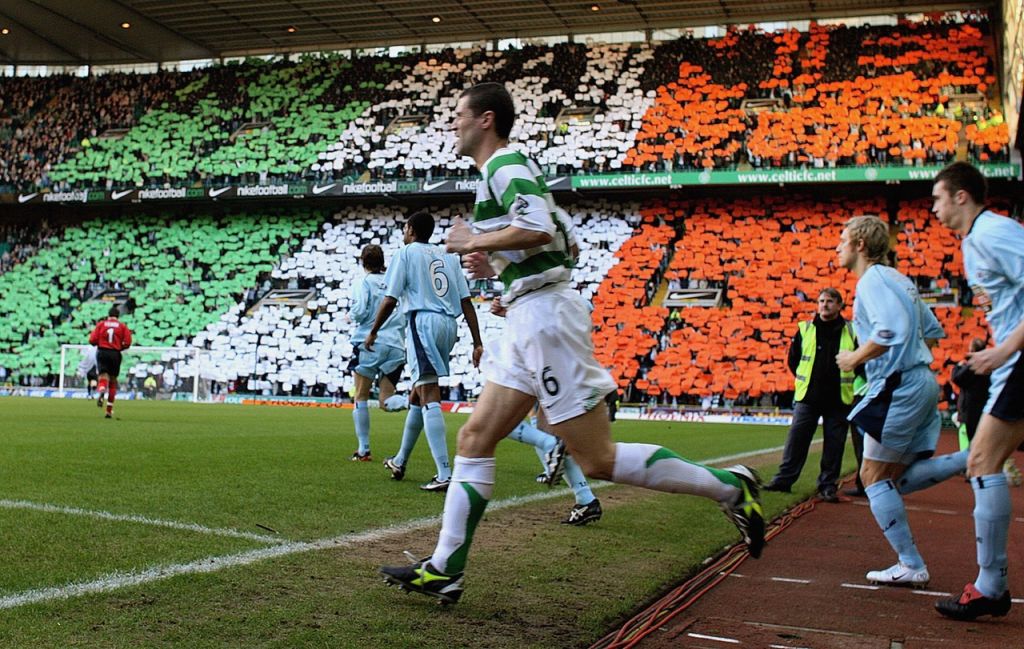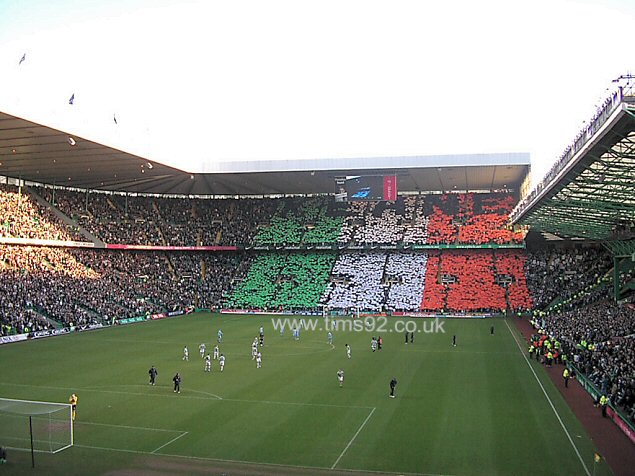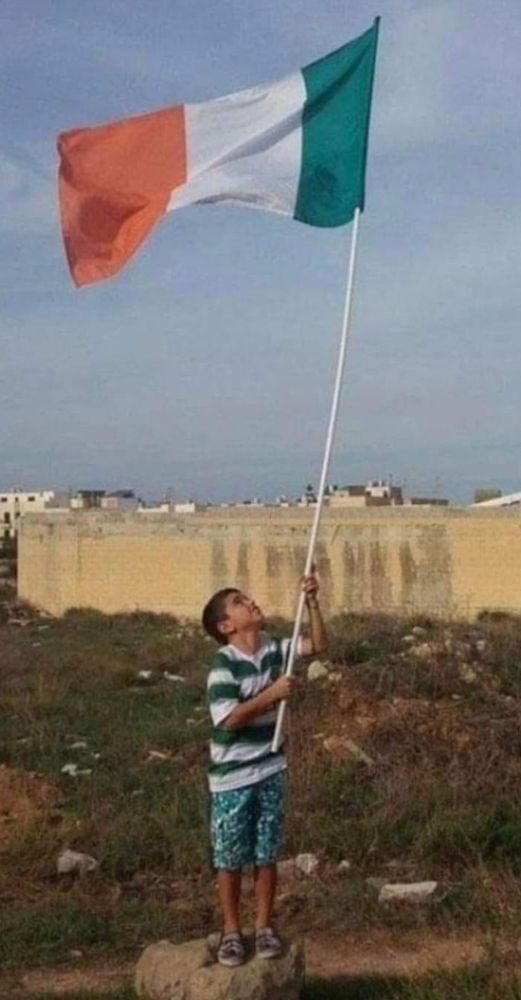Misc Articles | Celtic Lexicon
Details
Term: The Irish Club
Others: The Bhoys, The Irishmen, Wee Ireland
Reference: The historical Irish Roots & culture of Celtic
The Irish Club
| “When you’re an Irishman and you get your first goal for Celtic, it runs deep. This is a special day for him and his family.” Brendan Rodgers on Jonny Hayes (Dec 2017) |

Former chairman John McLaughlin once even joked referencing the point when he led a charge against Celtic’s original landlord in 1891 (who had attempted to impose a massive increase in rent for the first Celtic Park) when he said:
‘Being an Irish club, it is but natural that we should have a greedy landlord.’
The term may seem harmless but has had a lot of resonance. The great part is the celebration of the roots of the people who began this club for a disrespected community. The dark side to the use of the term is that Celts were branded as outsiders, and even unwelcome to some no matter for how long and how well their roots had been planted in Scotland.
One early match against Queen’s Park even saw the match dubbed in one source as ‘Scot v Celt‘. A match report for a Rangers v Celtic match, in September 1892, referenced Celtic as the Irishmen whilst Rangers were the Scots.
Along with Hibernian in the early days, Celtic were the flag bearers for the Irish communities, although Celtic relatively quickly opened up their ranks as the club evolved from being just a club to an organisation and then a fully functioning company. Hibernian on the other hand had to die first before sympathisers restarted the deceased club as a new club and then opened up.
In a match report on Celtic’s 1-0 victory over Hearts in November 1912, there was a reference in the Dundee Sporting Post to the terracing beside the Grant Stand at Celtic Park and directly opposite the pavilion being called “Wee Ireland”.
Note, that there could be euphemisms used to attack the Irish population in Scotland. Usually the obsession with “publicans” was not-so-subtle code for “Irish“; it was a means of social mobility for people locked out of crafts that might have required a membership, of, say Freemasonry.

The club’s roots are undeniably Irish in origin in cultural terms but not solely so. The Dundee Courier newspaper in a match report in September 1888 described the newly established Celtic as a ‘Glasgow-Irish Roman Catholic combination‘. However, the club’s identity is really a synthesis of cultures, of Scottish as much as Irish. The formation of the club involved Scottish elements as much as Irish ones, and in any case Celtic were playing the preferred Scottish football code (and not the Irish Gaelic varieties) with players mostly born and reared in Scotland and of differing Christian traditions. The cultures were therefore going to be mixed.
The Scottish Sport journal wrote on Celtic in 1892 as:
‘”The best combination of Irishmen that has ever been raised in Scotland, knitted together by an unquenchable desire to do honour to the Emerald Isle”.
As long back as when Celtic won the Scottish Cup back in 1904, Celtic’s first big fan blog in ‘The Glasgow Observer‘ referred to the victory as an ‘Irish Football Triumph‘. Taking in that all the starting eleven were at this point Scots born and a handful of them were of Scot’s Protestant background, the term was misplaced.
If anything, ‘The Irish Club‘ term was already becoming less representative of the side and players, but more about the supporters’ heritage, the players’ culture and the club’s foundation.
In an article on the arriving Celtic team to play the local Bohemians side in Ireland in 1952, the journalist opened up the article to describe Celtic as: “More Irish than the Irish themselves….“.
However not all were enamoured by the new club with a writer in 1893 in the North Britain Daily Mail newspaper derogatorily stating his unequivocal opposition to those of Irish heritage & pointedly at Celtic to be permitted to play for the national team:
“The Scottish Football Association was misrepresenting Scotland by allowing Irish, or Celtic players in a Scottish representative team. With all due deference to the Celtic men’s ability, I hold an accident of birth don’t make them Scotchmen. They, as a team, are banded together for Irish purposes”.
Incredibly, the term has on a few occasions generated countless wasted hours of debating amongst the more zealous in the support. Threads on forums have been locked over rants whether Celtic is either:
- a Scottish club with Irish roots; or
- an Irish club based in Scotland.
The arguments have all been ridiculous and a waste of time, and for some it’s just been an excuse to bash heads. To the rest of us with a bit more sense, it’s been utterly pointless. The argument should be put to bed if nothing else. It’s a pedantic point and each argument is as valid and irrelevant as the other. The club’s formation was too broad in its sources to be narrowed down to just the one single interpretation.
The irony is that opposition fans seem to have split personalities over Celtic’s relations to the old country and the term itself. Rangers OldCo fans threw potatoes at Celtic matches (a reference to the Irish potato famine), sang ‘The famines over, why don’t you go home!‘ but then paraded banners stating ‘Where in Glasgow is Ireland?‘. So were they taunting Celtic fans for being Irish or not being Irish? Barmy.
Anyhow, despite the evolution of Celtic and Ireland since the club’s inception, the ties remain strong. Everyone hopes that will remain the case. The club is very popular in Ireland, very much in the hearts of the faithful in the land. Supporters mix regularly on jaunts between the fans across the sea.
The term ‘The Irish Club‘ should be taken as a mark of pride reflecting the historic roots of the club and the huge role it has played in the culture and development of the supporters. Long may it remain but not as a definitive description as the club has grown and integrated so much more since then, and that is what we should all remember.
Links

1893 The Daily Mail on Celtic, the Irish and playing for Scotland:

2019 Bizarre theory here: From quote in the book “The Age of Football”
Apparently supporting Celtic (as part of a dark Irish secret) is for the Irish a sense of belonging to the old British Isles. Not one person at Celtic is convinced!
Articles
Stuart Cosgrove: Let’s not pretend Scottish football has no racism problem
Bulgarian fans at Monday’s match against England
https://www.thenational.scot/news/17980793.stuart-cosgrove-not-pretend-scottish-football-no-racism-problem/
Bulgarian fans at Monday’s match against England
THAT was not what I expected. For the first time ever, I found myself supporting England and agreeing with Boris Johnson . I doubt that those planets will ever align again, but I repeat: I was supporting England and I agreed with Boris Johnson.
The racist treatment meted out to England’s Black players in their international match against Bulgaria was both predictable and unacceptable.
There is neither defence nor mitigation in what was a disgusting display: fascist salutes, monkey chants and despicable bigotry in the stands has brought Bulgaria’s ailing international football culture into global condemnation.
Taking a break from his Brexit chicanery, Boris Johnson responded to the events in Sofia by saying: “The vile racism we saw and heard last night has no place in football or anywhere else. I fully support Gareth Southgate and the team for rising above it. We need to see strong, swift action from Uefa.”
I agree entirely, although I had never imagined Johnson as a football fan, unless he once played in the Worcestershire amateur league for the village of Bell End.
Marcus Rashford, Tyrone Mings and Raheem Sterling were all the subject of grotesque barracking and abuse they should not have to tolerate, and condemnation has come from all quarters.
At least six members of a Sofia ultras gang have already been arrested and Borislav Mihaylov, the president of the Bulgarian Football Union, has been forced to resign. According to those close to the politics of Bulgarian public life, the departure of Mihaylov may be connected to other matters, not least divisive local elections.
Some of the racists have been apprehended and it is up to the police and the Bulgarian football authorities to deal with them, but we should not ignore the layers of hypocrisy that have surrounded this story.
One obvious contradiction is the way the English press have recently treated one of the victims of racism, Raheem Sterling. He was castigated for having an assault rifle tattooed on his leg as an anti-gun gesture in support of his father, who was killed in a shooting in Jamaica. With gun crime rising in London, the media came down on him like a ton of bricks. In one exchange with the populist mouthpiece Piers Morgan it was pointed out that Morgan supports Arsenal, who are nicknamed “the gunners” and who have a cannon crest on their jerseys.
Although last week most papers rallied around Sterling, his lifestyle has regularly been castigated in newspapers that seem to resent young Black men earning substantial sums of money playing football. In December of last year Sterling retaliated, accusing the media of fuelling racism in their portrayals of the spending power of two young Black players at Manchester City who had bought houses for their mothers, arguing that the same focus was not placed on their white team-mates.
Mainstream news bulletins gave high-profile coverage to the racism in Bulgaria but they have been much less diligent about pointing to racism within England’s ranks. Only a couple of days earlier, in Prague, England fans rioted and 14 people were arrested. It is now such a common feature of England abroad that it passes for normal.
The Bulgarian ultras now in police custody have their corollary in England too. For years now, English football has allowed right-wing groups such as Tommy Robinson’s English Defence League, Britain First and the Football Lads Alliance to infiltrate their travelling support, and there is now compelling evidence that England take trouble with them wherever they go.
The ideology that dominates England abroad is a nasty white supremacy that is anti-Muslim, anti-Europe and anti-Scottish.
Racism has been a problem in Bulgarian football for decades and critics say that the football authorities have been slow to act, turning a blind eye or held back by their own internal agendas. That latter point should scare the Scottish Football Association, a deeply unpopular organisation with a long history of bureaucracy and indecision.
Where are we on tackling racism in the game? And how does all of this impact on Scotland? One obvious point is that Scotland can be a self-deceiving nation. We often imagine that we inhabit a society that is warm and inclusive; deep down that is a delusion and we all know it.
Scotland needs to stop believing that our Hogmanay spirit translates into tolerance of a diverse society. It is not so long ago that two Hearts fans were arrested for screaming racial abuse at Christian Mbulu of Motherwell, provoking Mbulu’s manager, Stephen Robinson, to describe the abuse as “dark ages and dinosaur stuff”.
Although most of our clubs commit to supporting the anti-racist charity Show Racism The Red Card, we need to move beyond symbolism.
My own team, St Johnstone, like many others, parades the giant red cards annually, but racism is a pernicious problem that can fester despite worthwhile campaigns, good intentions and worthy symbolism.
The SFA is currently undertaking a review of child abuse within football but it did so only at a point when the issue was given visibility by the media. It now needs to review racism with the same vigour and before new incidents emerge. At the very least it should commission an audit of racism at the grassroots of Scottish football, starting with those Black players that have been capped recently.
Ifeoma Dieke of the Scottish women’s team has 132 caps and has lived in Cumbernauld since the age of three. Dapo Mebude of Rangers has represented Scotland throughout the age groups and was a standout player in the U19 team’s historic victory over Germany last week. Karamoko Dembele made his debut for Celtic’s U20 team at the age of 13 and is seen as one of Scotland’s top young prospects.
These three players and many more besides have grown up in Scotland and played football here since childhood. What is their experience of racism in the street, at school, in dressing-rooms and as they travel abroad to represent Scotland? We simply don’t know because they have never been asked.
How about a survey of 100 Black players at every level of football, from the amateurs to semi-professionals and up to the national teams? There is much we can learn from their collective experiences. One obvious unanswered question is why young people from the Scots-Asian community who play football at school and in local leagues struggle to make an impact at the high-end of the game. What barriers, subtle or blatant, have been put in their way?
Beyond that, there is much more we can do. Uefa’s No To Racism policy has had an impact and many clubs, including Celtic’s Europa Cup rivals Lazio, have been sanctioned and forced to close sections of their ground. We need to learn from this. It is only very recently that Rangers had ground sanctions of a much lower order imposed on them. They were instructed to close a section of Ibrox in a home match against Legia Warsaw after a Uefa ruling that some of their fans were guilty of “racist behaviour” – specifically “sectarian chants”.
What was significant about that sanction is that it happened against St Joseph’s of Gibraltar, and yet no Scottish newspaper and none of the governing bodies mentioned any of this on the night and none reacted until Uefa delivered its judgment. Such myopia is no longer defensible.
The silence of our national bodies leads many people to question whether Scottish football is so inured to sectarianism, and in this case to anti-Irish racism, that it simply passes as normal.
Scotland has much to learn from events in Bulgaria. We need to bring our own house into order and stop being blase about racism in our midst. Sitting back and thinking racism is someone else’s problem is the problem.
Time for Celtic supporters to celebrate Scotland success as their own – because it has green-and-white-hooped hallmark
There was a green-and-white-hooped imprimatur on Scotland’s route-map out of their major finals’ wilderness.
By Andrew Smith
Sunday, 15th November 2020, 8:14 am
https://www.scotsman.com/sport/football/celtic/time-celtic-supporters-celebrate-scotland-success-their-own-because-it-has-green-and-white-hooped-hallmark-3035713
In all, no fewer than eight players with Celtic connections were involved in the white-knuckle ride of a penalty shoot-out success over Serbia that has allowed a flag to be planted in Euro 2020 territory. Apposite, really, since no fewer than eight Celtic players were in the squad for a France 98 that is the other bookend for the 23 years Scotland have been AWOL from such jamborees.
Indeed, in the modern age, there seems to be something about Celtic and special times for the country on the international stage. A fact that makes the uneasy relationship elements of the club’s support have traditionally had with the national team difficult to fathom.
So much emotion and telepathy
Ancient grievances really should be cast aside when a Celtic player can be so moved – and so moving – reflecting on his role in giving this country the finals appearance it has interminably craved. Ryan Christie’s outpouring of emotion that led to the tears flowing ought to have provoked the same reaction among all followers of his club. For this was a glory, as with Scotland’s World Cup campaign for France 98, that can be basked in with reflected pride for those holding Celtic allegiances.
Christie’s strike in Belgrade followed telepathic interplay with Callum McGregor. It was, then, forged in Parkhead. Scotland created a platform enabling them to prevail on penalties because Leigh Griffiths and McGregor had the gumption and guile to slam in the opening two, tone-setting, spot-kicks. Indeed, Griffiths demonstrated nerves of steel to step up for the very first penalty when he had not touched the ball in his brief, extra-time appearance.
All of this before David Marshall, a man whose footballing education and senior and international breakthroughs came at Celtic, fashioned the save to seal the end of so much sorrow. Marshall’s professional background has a number of parallels with that of Kieran Tierney, another graduate of Celtic’s academy whose grounding in the east end of Glasgow paved the way for his £25m move to Arsenal 15 months ago. A further three players that served Steve Clarke and the country with such distinction on Thursday also were once adorned in Celtic colours, even if only as pimply youths. A bracket into which, to varying degrees, Andrew Robertson, Declan Gallagher and Stephen O’Donnell can be placed.
As history shows
The links were far more direct for Craig Brown’s France 98 squad, with Tom Boyd, Craig Burley, Paul Lambert, Jackie McNamara, Tosh McKinlay, Darren Jackson, Jonathan Gould and Simon Donnelly then all fresh from doing their bit to ensure Celtic claimed a first league in a decade that famously ‘stopped the 10’ for Rangers.
Further consider that under Gordon Strachan, and especially for the narrow miss of 2016 World Cup qualifying campaign, the Scotland team would regularly feature six Celtic players. Across recent times, the country’s dominant club have pretty much enjoyed that status in the terms of dark blue representation.
Yet, still a section of the club’s fanbase choose to be sniffy about the national team. Celtic describe themselves as a Scottish club proud of their Irish roots. To those who see the Republic of Ireland as their de facto national side, it seems the impetus their club drew precisely through being based in Glasgow is too readily dismissed.
Celtic may have been a club formed to raise funds to alleviate the poverty suffered by Irish Catholics immigrants to the city’s east end, a minority group then the victims of discrimination as well as deprivation. The victim card, though, now deserves to be cast aside in understanding what Celtic means to Scotland, and vice versa.
It is true that even as late as the 1970s, there were reasons for Celtic supporters to feel their players suffered prejudice in the Scotland domain. It remains shameful that Jimmy Johnstone and Davie Hay were both booed by the pre-Tartan Army followers of the national team – then mainly those with a Rangers leaning – because these supporters’ preference for those positions were fine, but lesser, performers who called Ibrox their club home.
Dalglish situation
Equally, it remains inexplicable that Kenny Dalglish was denied a 34th consecutive Scotland outing in May 1976. An appearance in a Home International against Wales then would have allowed the Celtic striker to equal the record for successive internationals held by storied Rangers captain George Young. Dalglish was at that juncture in excellent form for club and country. However, Willie Ormond shocked all not just by failing to select him, but through electing not to substitute him late on, despite Scotland boasting an unassailable 3-1 lead.
In his autobiography, Dalglish speculated that Ormond – who reinstated him for the next Home Internationals against Northern Ireland and England, two games he just happened to score in – had been pressurised from within the SFA not to allow a Celtic player to claim a Rangers legend’s Scottish record. Dalglish thereafter started 34 straight internationals to claim the record as a Liverpool player, but that dubious omission against Wales denied him Billy Wright’s all-time record for consecutive such appearances, the England man having turned out for his country 70 times on the spin.
Time to move on
Those days are gone now, and in the past they should remain. Christie, McGregor and Griffiths are three of the most popular players on the Scotland international scene. Moreover, no national manager since Ormond has been other than desperately keen to field indigenous Celtic players, recognising that the level at which the club operates prepares these indiividuals for the peculiar intensity of international football.
All Celtic supporters should recognise, as unquestionably do those from the club honoured to represent their country, that Scotland success warrants communal celebration from each and everyone of us that call this little nation home.
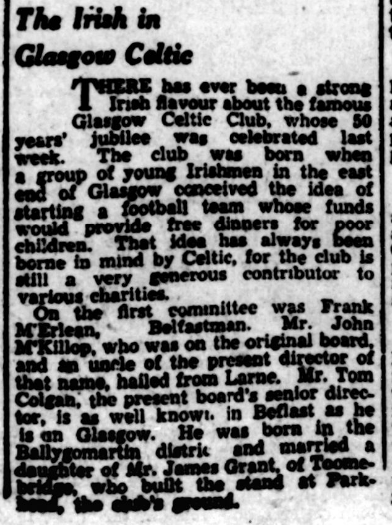
A wee snippet from the Irish Weekly and Ulster Examiner. 25th June 1938.
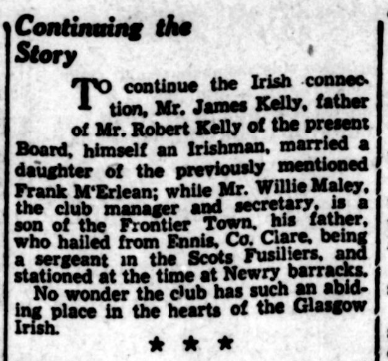
A wee snippet from the Irish Weekly and Ulster Examiner. 25th June 1938.


